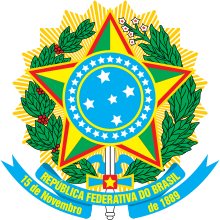النشيد الوطني البرازيلي
النشيد الوطني البرازيلي لحن على يدي فرانسيسكو مانيول دي سيلفا في 1882 وبعد الكثير من التغيرات في النشيد في 1922 اعتمد كنشيد رسمي لجمهورية البرازيل على يدي جواكيم دوكي استرادا ولحن نشيد يميل إلى النغمات الإيطالية الرومانسية كالحان الموسيقار جواكينو روسيني.[1]
| النشيد الوطني البرازيلي | |
|---|---|
 |
|
| البلد | |
| اللغة | البرتغالية |
| استمع للنشيد | |
| تعديل مصدري - تعديل | |

| النشيد الوطني البرازيلي (الكلمات البرتغالية) |
الترجمة | ||
|---|---|---|---|
| المقطـع الأول | |||
|
Ouviram do Ipiranga as margens plácidas |
الامواج الهادئة من ايبيرانجا سمعت. | ||
| المقـطع الثـانـي | |||
|
Deitado eternamente em berço esplêndido, |
و ضعت إلى الابد في أرض ممدودة, | ||
مراجع
عدل- ^ "Você entende o Hino Nacional Brasileiro?". Só Português (بالبرتغالية). Archived from the original on 2017-12-23.
You understand the Brazilian National Anthem? The National Anthem, symbol of exaltation of country, is a very complex song. Besides having unusual words, its lyrics are rich in metaphors. The text follows the Parnassian style, which explains the presence of flowery language and syntactic inversions, which hinder the understanding of the message. Thus, the prioritization of the beauty of form in the composition of the hymn compromised clarity. You, who already know how to sing the national anthem, do you know it because of its melody and tune, or do you know it for the meaning of its message? Most people, despite their mastery of the lyrics, are ignorant of their meaning. The following is the national anthem. Note the words highlighted and their definitions in parentheses. You'll likely be surprised by the things that you have always proclaimed, without, in fact, being aware of it.
وصلات خارجية
عدل